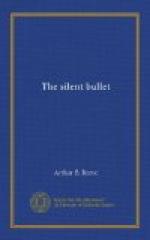Lamar said nothing.
“I’m glad to say you had no confederate in the hangar here,” continued Craig. “At first I suspected it. Anyhow, you succeeded pretty well single handed, two lives lost and two machines wrecked. Norton flew all right yesterday when he left his gyroscope and dynamo behind, but when he took them along you were able to fuse the wires in the dynamo—you pretty nearly succeeded in adding his name to those of Browne and Herrick.”
The whir of Norton’s machine told us he was approaching. We scattered to give him space enough to choose the spot where he would alight. As the men caught his machine to steady it, he jumped lightly to the ground.
“Where’s Kennedy?” he asked, and then, without waiting for a reply, he exclaimed: “Queerest thing I ever saw up there. The dynamo wasn’t protected by the sheet-lead shield in this flight as in the first to-day. I hadn’t risen a hundred feet before I happened to hear the darndest sputtering in the dynamo. Look, boys, the insulation is completely burned off the wires, and the wires are nearly all fused together.”
“So it was in the other two wrecked machines,” added Kennedy, coming coolly forward. “If you hadn’t had everything protected by those shields I gave you in your first flight to-day you would have simply repeated your fall of yesterday—perhaps fatally. This fellow has been directing the full strength of his wireless high-tension electricity straight at you all the time.”
“What fellow?” demanded Norton.
The two Pinkertons shoved Lamar forward. Norton gave a contemptuous look at him. “Delanne,” he said, “I knew you were a crook when you tried to infringe on my patent, but I didn’t think you were coward enough to resort to—to murder.”
Lamar, or rather Delanne, shrank back as if even the protection of his captors was safety compared to the threatening advance of Norton toward him.
“Pouff!” exclaimed Norton, turning suddenly on his heel. “What a fool I am! The law will take care of such scoundrels as you. What’s the grand stand cheering for now?” he asked, looking across the field in an effort to regain his self-control.
A boy from one of the hangars down the line spoke up from the back of the crowd in a shrill, piping voice. “You have been awarded the Brooks Prize, sir,” he said.
X. The Black Hand
Kennedy and I had been dining rather late one evening at Luigi’s, a little Italian restaurant on the lower West Side. We had known the place well in our student days, and had made a point of visiting it once a month since, in order to keep in practice in the fine art of gracefully handling long shreds of spaghetti. Therefore we did not think it strange when the proprietor himself stopped a moment at our table to greet us. Glancing furtively around at the other diners, mostly Italians, he suddenly leaned over and whispered to Kennedy:




